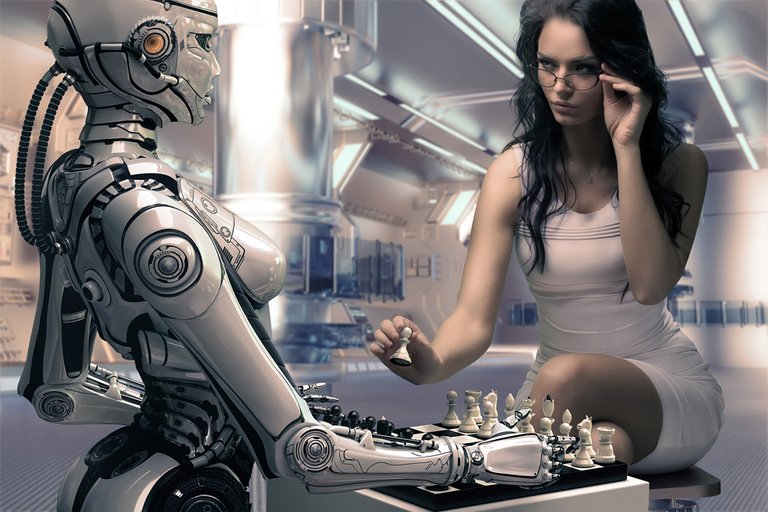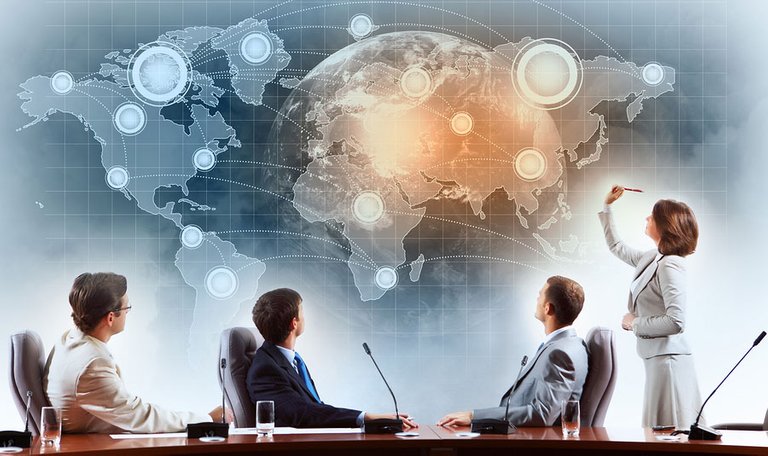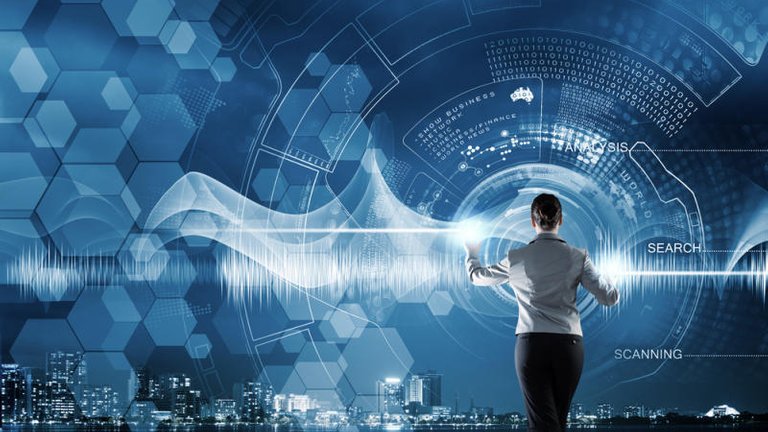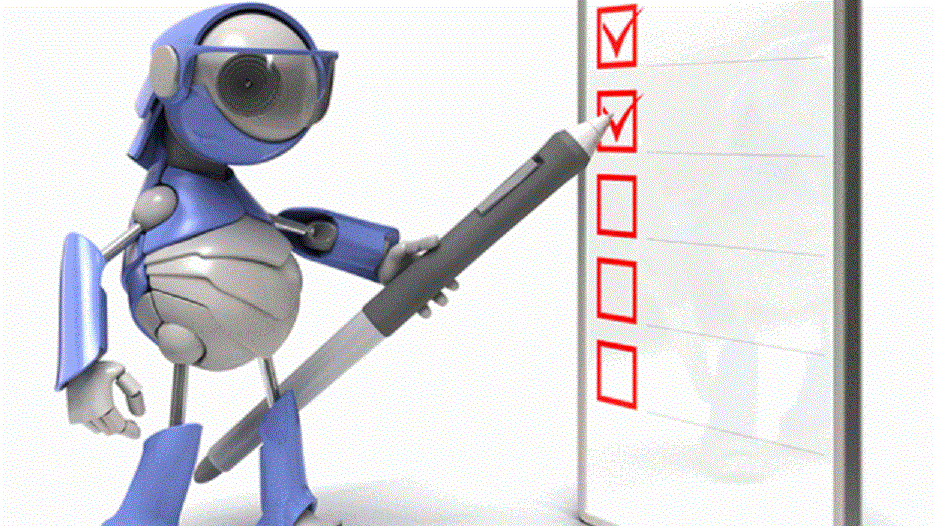
What is Artificial Intelligence?
In today's world, AI is anything that makes our lives easier and more enjoyable. It is technology that simplifies tasks and helps make us more efficient and organized. Applications like Microsoft's Cortana, Apple's Siri, and Google's Assistant are examples of how we use AI technology today. It relies on our interactions and inputs to guide an outcome. Other technology such as Rhoomba and Self driving cars are other examples of advancements made in AI technology, however because it is still guided by our inputs, the technology is still not self reliant or self aware.
Because technology moves so fast and because it is such a hot topic right now, eventually advancements in this field will lead to new discoveries and eventually, AI taking over more complex responsibilities that we currently perform on our own. Applications and technology in AI will eventually begin outperforming and replacing humans in almost all cognitive tasks.

Are we moving to fast?
As we move forward with developing this technology are we taking the proper precautions? Currently AI exists in our every day life as something that provides hands free assistance and guidance. As we journey further and develop more advanced AI technologies which begin to take over normal everyday functions and tasks such as driving our car, controlling our house and and resources, and even begin incorporating it in more free will autonomous robots, have we built in safe guards that ensure we can still maintain overall control? Im not saying the world will end up in a full terminator type scenario, but what if?

What does this mean for us?
The use of technology and advancements in AI could lead to inventing revolutionary new technologies, such a super intelligence which might help us eradicate war, disease, and poverty. The thought is that as AI evolves, smarter systems will be developed which could potentially lead to limitless self-improvement that would leave human intellect far behind. Technology and machines would grow smarter, faster, without the same limitations that humans have - limitations such as fatigue, capability, and capacity.

An easier and better life, or a life under control?
Does this mean that we as humans, would eventually be giving up control? Over the next decade, it’s entirely possible that entire business divisions will be run by AI programmers with minimal human oversight. Many of the daily tasks we try to avoid or even those we find tedious could be easily handled by technology developed through AI research. Those tasks and jobs we don't feel like doing or don't want to do would be cared for without any complaints so we could focus on doing things that we really want to do. What is the price for such freedom?

Do you trust that AI will make our lives better? As of today, AI is governed by a number of algorithms and codes of logic. Decisions and outcomes are determined by a series of inputs and unlike humans does not take into consideration any form of emotional thought. Some argue that in some cases this may be better, but in certain situations it may not be.

Because I love technology and innovation, I'm excited to see where these advancements take us. I am cautious however, because like all things created by humans, there is the potential for side affects or the ability for it to be used for bad.
Related Articles worth reading:
- AI will create 'useless class' of human, predicts bestselling historian
- I, FOR ONE, WELCOME OUR AI OVERLORDS
- How Artificial Intelligence Will Change Our Lives, for Better or Worse
- BENEFITS & RISKS OF ARTIFICIAL INTELLIGENCE
As always Thanks for reading and keep on Steeming!!
Please let me know what you think in the comments below

Look for "Im" in your last para. :-)
To me, one of the more interesting development is autonomous vehicles. It'll cause another disruption - seeing Uber and Grab kicking out their own drivers perhaps.
self driving cars will save a lot of lives.
It wouldnt' take much to be a better driver than most people.
30K people die in car wrecks yearly
250K are maimed.
True, but i think in order for it to be totally effective, everyone needs to adopt it. Afterall, if several bad and reckless drivers decide not to use a self driving car, they can still cause accidents. Either that or autonomous vehicles will have to learn how to predict bad drivers actions and be able to react immediately. I do think that it could lesson the number of accidents though.
Nothing is totally effective.
Go with the probabilities.
Risk management.
We had trials and trials and I think it will happen sooner for Singapore though some unfortunate news recently.
http://www.channelnewsasia.com/news/singapore/nutonomy-halts-vehicle-trials-after-accident-at-one-north/3219314.html
If it's all driverless, it's safer that some driverless and some manual.
Does not commercial airlines mostly auto-pilot except take off and landing?
A computer will never, and can never help with these. These are all created from the mindset of humans. They are not from outside forces. The healing has to come from within.
Also, computers cannot think outside the box.
Einstein said, "You cannot solve a problem with the same mind that created it." You have to create a shift in your thinking.
Computers are the definition of in the box thinking.
A binary computer's world is 0s and 1s. It will never, ever think of a 2.
Bucky Fueller stated, "We now have the capability to feed the whole world, now we just have to get everyone to understand this." - how to end poverty and war.
self awareness is an emergent property of a sufficiently complex network.
I disagree. I have evidence, unfortunately it won't be proveable until we understand a lot more about consciousness.
show me one case of self awareness that is NOT an emergent phenomena of a complex network.
I could respond with, show me an AI that has become self aware. But that just leads to name calling.
Lets take ghosts. No physical body, and yet, they are self aware. But, you would have to believe in ghosts for this to be any kind of evidence.
Nonetheless there will come a device that will allow us to see many entities heretofore invisible to the naked eye. And many of these entities are sentient. When this happens, my statements will become apparent.
It is coming, until then, we are in a predicament where you can't see my evidence, and you can't show me an AI capable of creation. :-(
In the meantime, you can go read some ancient buddhist texts that outline consciousness in a much deeper manner than I can write.
I'm not sure we can say "never." If we were one day able to clone or create a human brain, wouldn't that too be technically considered somewhat artificial intelligence? I also think in the case of diereses and sickness, AI can help to find cures quicker. Like you said though in your 2nd reply... we won't know or be able to prove any of this until we understand more about consciousness or the time comes when the technology is more advanced.
I can say never because I know that the brain and the mind are separate.
So, a fully copied brain does nothing but keep the body functioning.
Here is one clue:
Take a person and cut their arm, and even in the worst conditions it will heal itself.
Take a person and kill them. Then immediately put them on a respirator and get their heart beating again. They have all the vital signs of life, but if you cut their arm, and then clean the wound, sew it up, bandages and everything... the arm will never heal.
you have a new follower - STEEM ON!
I believe the biggest consideration about AI is this: if a machine managers to reach the human cognitive capabilities then by definition and construction it will be able to surpass these capabilities multiple-fold in a really short time (having access to a vast knowledge pool through internet). That in turn will lead to a superior cognitive entity, which we will not be able to follow, let alone manage and control. Nobody knows were this can lead, and this is exactly why Elon Musk and Stephen Hawking commonly published a call for prudence towards the scientific community.